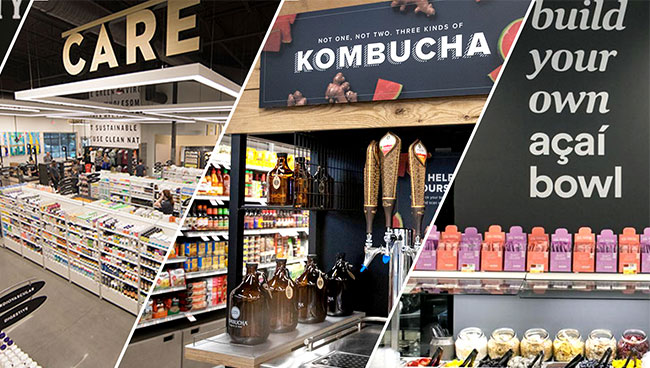Socializing in the store aisle is sooo 2017. Today, experiential retail increasingly centers on efficiency rather than entertainment. The trick is understanding the changing definitions of each. For grocery brands Giant, Publix, Hy-Vee and others, it comes down to right-sizing the experience. Here’s what all retailers could learn from them.
Aiming to hit the bullseye on the in-store retail experience? Good luck. It’s a moving target.
For today’s future customer, experiential shopping is less defined by social quests centered on lingering and schmoozing. Rather, their expectations of the brick-and-mortar trip involve efficiency, pragmatism, informative encounters and targeted explorations of lifestyle-specific products.
These preferences apply to all retail. However, a good place to see this phenomenon play out is in the grocery sector. In particular, several big-name supermarket chains are reformatting the new experiential trip into smaller formats that don’t skimp on service or selection. As detailed in our recent Gotta See analysis, “The Right Size Round-Up”:
Hy-Vee Fast & Fresh: These new small-format locations combine function with fun. The stores feature multiple entrances, Starbucks drive-thrus, fuel pumps and designated mealtime sections. Of the meal choices: premade dishes, hot prepared foods (“Pizza in 6 minutes”) and kits of varying serving sizes and prepare times. There’s also a growler station for quick craft beer fill-ups.
Publix GreenWise Market: Publix’s new markets focus on fresh food and community, divided into five themed departments that keep the trip flowing: “Pours,” “Care,” “Finds,” “Eats” and Cuts.” Shoppers glide from one department to another, experiencing different ways to access food and beverage from tasting wines (Pours) to picking up a noodle bowl (Eats) to selecting locally raised meats (Cuts). Shoppers can then enjoy their olives, freshly ground peanut butter and other gourmet snacks (Finds) in comfy chairs with beers and friends in the upstairs communal loft space.
Giant Heirloom Market: Designed to capture urban shoppers, these European-style markets deliver fresh, local and seasonal products under menu-like designations, such as “Garden” and “Land & Sea.” The sense of community and interactivity is further supported by local vendors and on-tap items like olive oil and kombucha Yet there is an important tech aspect: 100% self-checkout, Wi-Fi, plug-in stations and refrigerated pickup lockers.
Whole Foods Daily Market: This Manhattan spot is a mini-Whole Foods, zeroing in on quick-hit categories such as coffee-and-juice bars, grab-and-go baked goods and packaged sliced fruits. Seating and plug-in areas are positioned near the entrance/exit, and checkout is fast – shoppers can do it themselves or choose a cashier.
Right-Sizing Your Shop: 4 Takeaways
These merchants aren’t redefining experiential retail alone; the shopper is leading the way. Ready to be part of that experience? Here are the four must-haves we’ve spotted in our research:
- Be small but act big. This combination is the key to offering both variety and speed. The trick is ensuring the selection is curated to suit needs specific to the targeted shopper, such as easy-grab meals and healthy options.
- Be hyper-local. In all brick stores, community should be immediately accessible. A small format can accomplish this by including a cross-section of familiar, local vendors and interactive displays that involve shoppers in “making” the food together.
- Appeal and convert. In addition to capturing neighborhood shoppers, small-format experiences build loyalty with focused amenities such as alternative prepared meals (like vegan), customized olive oil and craft beers.
- Plug in the bricks. There is no longer a question about it: The future shopper experience hinges on a physical store with digital advantages. It can take the form of the endless aisle, same-day delivery, in-store pickup or a place to plug in and eat that prepared vegan meal. Ideally, all four.
Lastly, be ready to change. The definition of experiential shopping is fluid, and the best way to own it is stay on the move.


